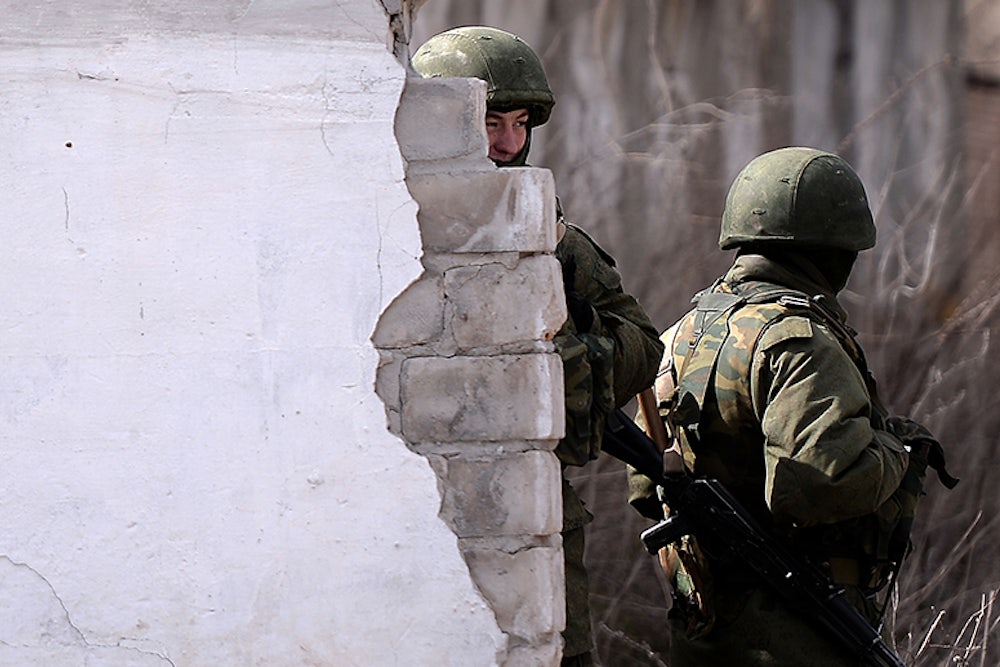Tomorrow, Secretary of State John Kerry will meet with Russian Foreign Minister Sergey Lavrov in London—part of a last-ditch effort to identify a diplomatic “off-ramp” for Russian President Vladimir Putin and halt the Kremlin’s annexation of Crimea. But the only real question regarding near-term Russian policy at this point seems to be whether Moscow will move to absorb the territory immediately or create a lengthier legal process of annexation that leaves Crimea in limbo for the moment.
On Sunday, the people of Crimea will have the chance to vote to leave Ukraine and join the Russian Federation. Following this vote, Putin could decide to move quickly to absorb the territory, thus generating fears elsewhere in southeastern Ukraine that those lands might be next in line. Or, he could create an annexation process that takes longer, thus keeping the Ukrainian government off-balance in the lead-up to national elections at the end of May. Either way, the message to Ukraine is clear: Russia will do everything it can to prevent you from pursuing a pro-Western policy by creating uncertainties regarding the government’s control over its territory.
Obama has rightly declared the need to impose political and economic costs on Russia for its actions, even though these steps are unlikely to affect the future of Crimea. Russia’s use of force in Crimea violates the territorial integrity and political sovereignty of its neighbor, a violation made even worse by Russia’s commitment 20 years ago not to invade Ukraine after the removal of the latter’s nuclear weapons. Obama’s efforts to engage international forces—such as the Organization for Security and Cooperation in Europe (OSCE), the G7, and the United Nations—to demonstrate the increasing international isolation of the Russian government, alongside the imposition of sanctions on the Russian elite, are important steps to raise the costs on Putin as he calculates long-term Russian foreign policy interests.
But these efforts may not change much in Putin’s calculation. Since he came to power, Putin has made it clear that he views his neighbors as part of Russia’s sphere of influence. He is not interested in their political and economic success; moreover, he seeks to prevent them from pursuing such success by impeding their attempts to establish closer ties to the West. Through his previous actions in Transnistria, Abkhazia, and South Ossetia, he has purposefully increased the insecurity of the governments of Moldova and Georgia to hinder their pro-European aspirations. He is repeating this behavior in Ukraine.
Some have proposed that the European Union is to blame for this crisis by proposing an association agreement with Ukraine, and others continue to blame NATO for its enlargement over the past fifteen years. These critics argue that the West should declare off-limits the prospect of Ukraine joining Western institutions. This is unfortunate. For more than two decades, successive U.S. administrations and their European partners have sought to promote a Europe that is whole, free, and at peace. While Ukraine’s failure to eliminate massive corruption has frustrated Western aid officials, the purpose of this economic assistance has been to help Ukraine develop successfully alongside neighbors like Poland. To argue that Ukraine should not have that opportunity simply because of its proximity to Russia—and thus its location within an area that is intimidated and bullied by Russia—is not a policy to which the United States should accede. Obama, to his credit, has stood firmly behind the new government in Kiev.
Sadly, as long as Putin remains in power, countries like Ukraine, Moldova, Georgia, and perhaps, in the future, Kazakhstan will face fear and insecurity. He is currently in control of Ukraine’s territorial and political future and will not be immediately swayed by the political and economic costs President Obama has said he will impose. Over time, if the Russian elite suffers from sanctions, including having assets frozen, pressure may build on Putin to take a different approach. Meanwhile, the Ukrainian government should unite—as it has not been able to do in previous years—to pursue good governance, root out corruption, and stay on track for elections later this spring.
James Goldgeier is the dean of the School of International Service at American University. Follow him on Twitter at @JimGoldgeier.
